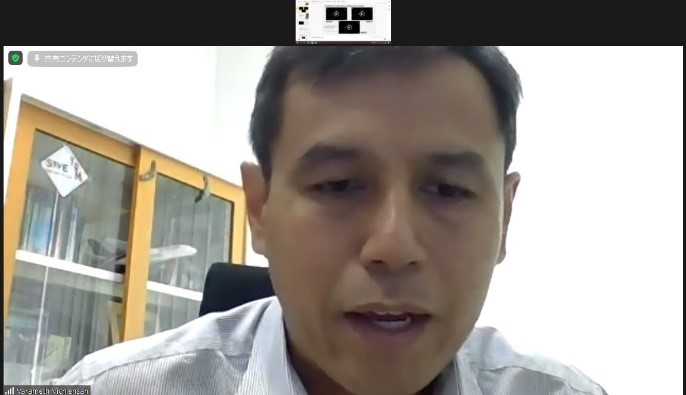Sakura Science Plan
As part of the Sakura Science Plan supported by the Japan Science and Technology Agency, we conducted an online program to promote international exchange between Thai and Japanese students through traffic research. Three students from Kagawa University and Chubu University participated from the Japanese side, and a total of nine students from Asian Institute of Technology (AIT), Chiang Mai University, and Kasetsert University participated from the Thai side.
In this program, the kick-off seminar held in November started with a greeting from Prof. Kii (Kagawa University), after which the participants introduced their own universities and deepened exchanges. Then, Assistant Prof. Miyazaki (University of Tokyo) gave a lecture on how to create a research plan, and the participants actually made a research plan. After the kick-off seminar, the participants spent a month learning how to use traffic simulation using on-demand educational materials. Any questions were resolved through online meetings held as needed, interacting with each university. Each university then proceeded with their own research using the traffic simulation and presented their findings at the online presentation in December.
Final Presentation
On December 23, 2020, university students from Thailand and Japan made online presentations of their research using traffic simulation. In this presentation, the participants presented their research plans and the faculty members of each university reviewed and gave feedback. The presentation was facilitated by Prof. Kii (Kagawa University) and Associate Prof. Varameth (Kasetsert University), with a total of 17 participants. The presentations, which were put together in a short period of time, were highly appreciated by the reviewers for their timely reflection of current issues. For example, a group from AIT simulated the traffic congestion that would occur during evacuation in the event of a tsunami in Phuket, and students of Chiang Mai University presented an analysis of traffic demand before and after COVID-19 in Chiang Mai. Mr. Witsarut Achariyaviriya, who is studying at Chubu University from Thailand as a member of this project, explained how a flexible lifestyle that maintains a new work-life balance, or quality of life (QoL), can be improved from a lifestyle that only emphasizes time efficiency. Mr. Achariyaviriya presented how a flexible lifestyle can contribute to reducing traffic congestion.

The simulation results of tsunami evacuation by AIT group

The traffic demand analysis before-and-after Covid-19 epidemic by Chiang Mai Univ. group

The impact of QOL-enhancing lifestyles on traffic demand load
by Chubu Univ. group

The feedback comment by Prof. Varameth